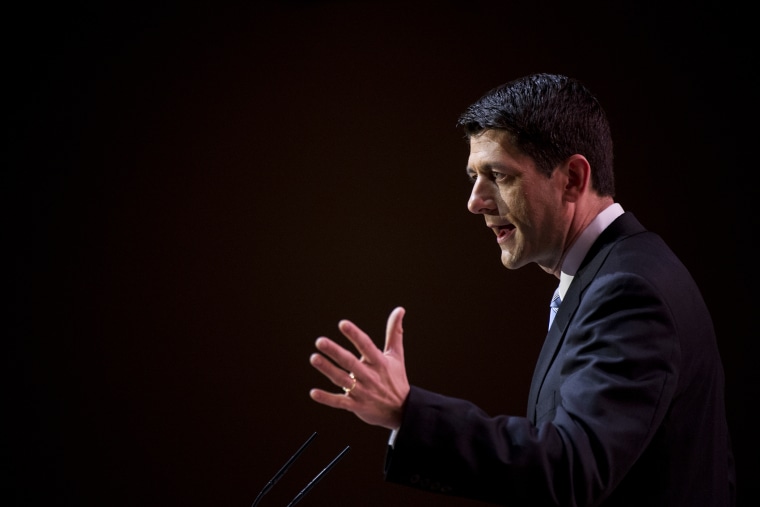If Rep. Paul Ryan is considering a presidential bid in 2016, he’s not using his listening sessions to test material.
The Wisconsin Republican broke no new ground as he kicked off his nine-stop listening session tour throughout his district, favoring PowerPoint slides and economics jargon over barn-burning rhetoric.
Budget cuts, tax cuts and expanding fracking into federal lands were the main points of Ryan’s introductory presentation, but he came prepared to sell the crowds of mostly older, almost entirely white constituents on his upcoming budget, repealing the Affordable Care Act, and his ideas about the limits of executive power. Big applause lines were limited to jokes about trash collection and cheese naming rights under the Trans-Pacific Partnership.
Ryan’s district is relatively safe territory – he won re-election while running for vice president by 11.5 points – which has given the eight-term House member a chance to see how his arguments for slashing programs like Supplemental Nutritional Assistance Programs (SNAP) and against the Affordable Care Act will play among voters.
In North Prairie, Wisc., a town of just over 2,100, a little girl gave Ryan an opening to further walk back comments he made last week about “inner city” residents. In an interview with radio host Bill Bennett, Ryan spoke of the "generations of men" who don’t appreciate the “culture of work.” After facing backlash, Ryan later walked back his "inarticulate" remarks, but told the girl in North Prairie Wednesday that "work is the bridge to a better life" -- a notion he reiterated several times during his listening tour.
"Work is how a person gets the dignity and finds their potential," he said," and our government, in many ways, inadvertently has put up all these barriers to work."
Ryan, through the House Budget Committee, released a 204-page report critiquing the effectiveness of federal anti-poverty programs at the beginning of March. In it and at his town hall meetings, Ryan called persistent poverty a “trap” created by overly-generous benefits that discourage work. There were slides, statistics and references to decreasing labor force participation, but no mention of the 49.4% of low-wage workers who are over 25 or the fact that SNAP has the lowest fraud rate of any federal assistance program.
The closest thing to antagonism Ryan experienced came in the Milwaukee suburb of Franklin, when he faced multiple questions about Congress’ failure to pass immigration reform last year. Melissa Sanchez, a student at the University of Wisconsin Rock County studying to become a physics teacher, asked Ryan on both Tuesday and Wednesday whether he would push to reform immigration law this year.
Sanchez, who is attending school thanks to President Obama’s actions to help the young people known as DREAMers, came to the U.S. with their parents. She told msnbc that the step-by-step approach Ryan laid out in his presentation felt like a stalling tactic. “I understand what he’s saying,” she said, “but doing it step by step, it seems like they’re delaying.”
Activists working with Fast for Families, which stopped in Wisconsin during a bus tour through 75 congressional districts, pushed Ryan to take a leadership role in reform negotiations. Some activists were on the tour for 22 days and also criticized the lack of progress.
By keeping questions and topics focused at the federal level, Ryan was able to avoid tying himself to controversial state policies. The state legislature could soon vote to restrict early voting, which could disenfranchise poor, disabled, elderly and non-white voters. It could also inconvenience Ryan himself -- he voted using absentee ballots 16 times since 2006. Scot Ross, Executive Director of One Wisconsin Now, attended the Franklin session hoping to ask Ryan about his position on the laws, but did not get a chance to speak.
“Rep. Ryan has held a series of in-district town halls but has remained studiously silent on the latest, racist attacks on voting in Wisconsin,” Ross said.
If anything, Ryan’s constituents are concerned about him not being hard-line enough. In North Prairie, boos greeted Ryan when he discussed his budget deal with Washington Senator Patty Murray, a Democrat, for preventing more government shutdowns. When asked why so little was getting done in Washington, Ryan, who has supported slashing food stamps, opposed extending unemployment benefits, and is touring Wisconsin pushing for tax cuts for corporations, said, “The poisonous climate really bothers me.”
